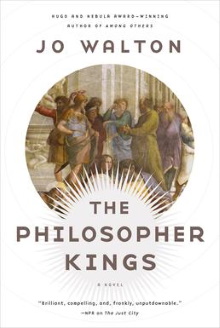
As promised, here is the second book of Jo Walton’s Thessaly trilogy, though it has been more than half a year since I read The Just City. I loved both the premise and the characters in that book but after a while I do have to admit that it’s a bit of an intellectual lightweight when set against its ambition and promise. Similarly this book is a fun and highly satisfying read but ultimately ducks out of any real philosophical clash.
This novel takes place more than a dozen years after the first book and unfortunately opens with Simmea dying. It is revealed that immediately after the Last Debate between Athena and Socrates, many people leave the Just City to found new cities and communities of their own. Simmea and Apollo, still in his mortal guise of Pytheas, remained in the original city and bring up their children who are all aware of Apollo’s true identity. After a while the new cities grow resentful of the all of the art still in the possession of the Just City and launch art raids to steal some of them. Simmea is killed during one such raid, driving Apollo into an all consuming fit of rage and depression. He suspects that Kebes who left the island entirely after the debate was responsible and wanting vengeance, pushes for an expedition to explore the other islands around Thera. This book also introduces a new key character, Arete, who is the daughter of Apollo and Simmea.
As with the first book, the point of view switches between several different characters. This does somewhat diminish the reader’s sense of identifying with anyone in particular but makes it easy to continue their individual subplots, such as Maia’s relationship with Ikaros. I do love the Arete chapters, being someone who was born after the Last Debate and had always known that her father is a god. Along with her brothers, she is a hero and events in the story lead them to gain magical powers. She is the obvious successor character to Simmea here and her name itself means excellence, which makes her point of view both a lot of fun to read and more philosophical than most as while she too grieves for her mother, she can see that her father has been driven past the point of rationality by his human emotions.
Unfortunately once again the book lacks intellectual heft. An ideological clash between the Greek pantheon and Christianity, introduced before the birth of Christ by the time travellers, seems like a fruitful subject of debate and the book keeps referencing how Ikaros has worked hard on reconciling the two seemingly incompatible religions. But the book never shows the work and ultimately ducks out on any serious discussion of the issue. Even more so than before, this novel is driven by plot and the emotions of the main characters rather than any continuation of the effort to define what it means to be a philosopher king or how best to build a society that makes its citizens become philosopher kings. The book ends with a blatant deus ex machina that is admittedly rather exciting to read but is a clear admission by the author that she has no idea where else to take the idea of the Just City itself.
I think I will read the last book at some point as its premise of the city being transplanted to space is too fun to pass up. But I can also see why despite its amazing premise, this series hasn’t really gained much attention or won any major awards. It’s lightweight in terms of its relaxed, conversational prose, in how things feel sort of okay even despite Simmea’s death and the horror that Apollo does in response, and how it completely gives up on trying to be a highbrow book at all. I’d still recommend the first book but pick up this one only if you really like Walton’s version of Apollo.